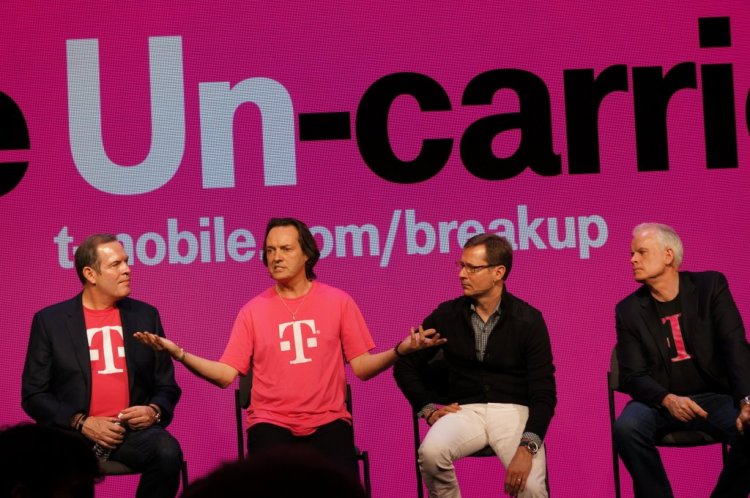In an exhaustive 677-page submission today, T-Mobile formally asked for the FCC to approve its proposed merger with Sprint, hoping that U.S. regulators will move quickly to let the companies build a unified 5G network. While the submission largely builds on earlier statements from T-Mobile and Sprint executives, the company is now promising to “leapfrog” AT&T’s and Verizon’s upcoming 5G networks, as well as using its new resources to offer an inexpensive broadband package to U.S. customers.
As the FCC is reviewing the merger to determine whether consolidating two of the top four mobile providers will be in the “public interest,” T-Mobile’s pitch focuses heavily on illustrating consumer benefits from the merger. Among the submission’s claims:
- T-Mobile will invest nearly $40 billion in a combined 5G network, which by 2024 will offer triple the 5G capacity that T-Mobile and Sprint would have mustered as separate companies, with four to six times faster speeds.
- T-Mobile expects to leapfrog rivals with its network’s superior breadth and depth, forcing Verizon and AT&T to move faster and offer better service to remain competitive.
- Thanks to doubling of its network capacity, “the cost of delivering each gigabyte of data to customers will be greatly reduced,” leading to a claimed “55 percent decrease in price per GB and a 120 percent increase in cellular data supply for all wireless customers.”
The submission also says that the T-Mobile 5G network will eliminate the gap between mobile and fixed broadband performance, enabling T-Mobile to offer “an aggressively priced wireless in-home broadband solution to compete head-on with the traditional providers.” T-Mobile CEO John Legere spotlighted this point in a typically bombastic accompanying blog post, saying:
These cable/broadband providers are some of America’s most hated companies in the market, and for good reason — they treat their customers horribly because so many of their customers don’t have any choice! Personally, I can’t wait to bring the fight to them! In fact, I plan for the New T-Mobile to be the country’s fourth largest in-home ISP by 2024, freeing millions from the likes of Comcast and Charter in the process!
Arguably the most compelling claim in the submission is the suggestion that a combined T-Mobile and Sprint will have a better shot at materially eroding its carrier rivals’ market share. “The combined company will have lower costs and the incentives to engage in aggressive pricing to expand its 4G LTE customer base as the industry continues its major transformation towards 5G,” T-Mobile claims, promising continued “Un-carrier” disruptions, more choices for customers, and new deals targeted at both mobile and cord-cutting broadband users. Many of the benefits will be targeted at rural areas, small towns, and otherwise underserved communities.
June 5th: The AI Audit in NYC
Join us next week in NYC to engage with top executive leaders, delving into strategies for auditing AI models to ensure fairness, optimal performance, and ethical compliance across diverse organizations. Secure your attendance for this exclusive invite-only event.
For their parts, Verizon and AT&T have each downplayed the importance of the T-Mobile/Sprint merger, portraying it as all but irrelevant to their separate plans to build competing but different 5G networks. The “new” T-Mobile’s interest in grabbing customers from cable companies and ISPs comes as Comcast and others continue to explore service offerings to compete with cellular companies, either using 5G wireless or higher-speed wired technologies.

